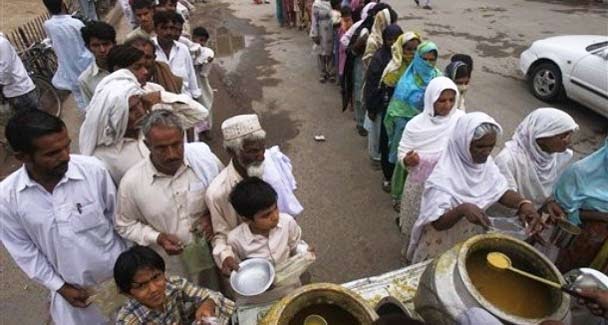
Hunger and malnutrition are stalking Pakistan as political leaders and Generals are squabbling over profits of office.
Various local and international reports have cited increasing hunger and malnutrition, especially among children, across at least three provinces of Sindh, Khyber-Pakhtunkhwa and Balochistan.
At least 10.5 million people are facing daily hunger in at least over 45 districts, latest UN and FAO surveys have found. Of the millions of affected children, around one-third of them are aged from 6 to 23 months. The UN in April this year had cautioned that children were being pushed into life-threatening, acute malnutrition.
In its latest report, FAO has warned Pakistan of becoming a “hotspot with very high concern“.The survey cautioned that in the time frame of June to November 2023, the situation was likely to worsen unless remedial actions were initiated.
But with the political leaders as well as the Generals more keen on ensuring a manufactured mandate in the elections likely to be scheduled in October, little attention is being paid to the misery and tragedy of millions of people across the country.
In fact, so uncaring is the civil society that rarely has any newspaper or media channel highlighted the plight of a large section of people. The situation is more likely to be far more serious since there is little information about such conditions from vast regions like the tribal areas, occupied Kashmir and Gilgit-Baltistan.
In Sindh, the situation has been worsening in the past few months. Several reports are coming in from distant villages in Sindh, like Okari Chaudhagi. Medical camps in these areas are bringing out widespread cases of malaria, skin ailments, fever and cough rising as a result of malnourishment in mothers and children. A large number of them are at risk of death unless immediate therapeutic care and food was provided to them.
These conditions have added to the already shocking state of child health in Pakistan. Various surveys have proved that nearly half of children under the age of five experience stunted growth, and 30% suffer from wasting. One concern that has attracted global attention was the inadequate intake of essential micronutrients among Pakistani school children. Shockingly, over 80% of children fail to meet the recommended intake for calcium, iron, zinc and vitamin A. Vitamin C deficiency affects 60% of children, while B-vitamin and folate deficiencies affect 25% and 75% of children, respectively.
The FAO has warned that food insecurity and malnutrition within and beyond the analysed regions was likely to deteriorate as there was negligible chance of any improvement in the political or economic crises, which means households would be hard pressed to afford food and essential medical assistance in the months ahead. This is a colossal tragedy unravelling in Pakistan where the leaders, both in civil and khaki, have no time to worry about the dying people, and children.






